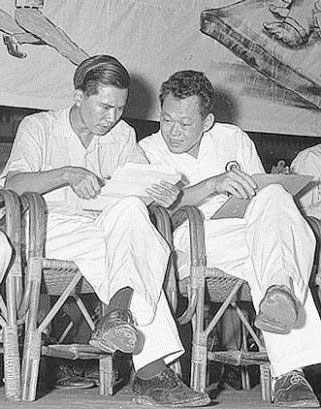The Singapore Story, part 2: Where Lee Kuan Yew got it wrong

L to R above: Lim Chin Siong and Lee Kuan Yew
By David Lim
In April’s edition of this blog, I wrote about how Singapore’s current success was owed, in no small part to its indefatigable first Prime Minister, and much admired statesman, the now late Lee Kuan Yew.
Over the decades, many have come to admire the success story of this small island, devoid of the kind of natural resources, be they forestry, minerals, or hydropower. Many admirers, though, would not want to live in Singapore as Singaporeans, and many detractors,secretly wish their own leaders could be so effective insightful, and totally incorruptible as Lee was known to be. There are however, some key things Lee didn’t get quite right, and these mistakes will return to haunt Singapore, and have a significant impact on long term efficacy of its greatest resource – its people.
Draconian internal security measures
First, he capitalized on, and hung on to various draconian internal security measures to shore up his political power in the late 1950s and 1960s and then beyond the turbulent 50s and 60s, even though his power became absolute, and his position secure by then.
Freshly declassified documents from Whitehall are being explored, and new narratives are now emerging on the founding of modern Singapore. It seems that the heroic struggle against the communists elements; muted by the jailing without trial of over 100 political foes and activists in the now infamous Operation ColdStore in 1963 – was not what it seemed to be. The new narratives suggest how the charismatic and former co-founder of the ruling People’s Action Party (PAP), Lim Chin Siong was detained without trial for years, effectively ending a socialist, possibly pro-communist government of Singapore; even if many in Whitehall did not believe he was a Communist party member. When Lim Chin Siong was freed from his first bout of detention without trial, he broke away from the PAP, which he co-founded, in 1961 to form the Barisan Sosialis party. Lim’s taking away of the core of the PAP support at the grassroots level was so immense, and his ideas and presentations of them so sought-after, that he was an immediate political threat to Lee and his British supporters. He thus became one of those arrested and detained without trial. He was held until 1969, when he renounced politics as a condition of release. These laws were further used in Operation Spectrum in 1987 again when various social and church workers were arrested detained and tortured for their involvement in a Marxist conspiracy to ovethrow the government -that was never proven.
Not only did Lee go on to rule Singapore for decades, he also, ensured many of his previous political enemies, like Lim, spent many years in detention without trials, even after they were de facto ineffective as politicians, or when there was no evidence to support their continued detention. The new findings in no way sully what Singapore has achieved under Lee’s party, but offers a less than complimentary view of the official position on these prisoners of conscience.
Top-down, authoritarian approach
Second, Lee’s top-down, authoritarian approach to controlling everyone’s lives; expressed in countless regulations and campaigns to stop littering, to stop making babies after having two, to be more courteous; may have had its place in the early days of newly independent Singapore. But the continuation of top-down politics has seen an eroding of the PAP’s share of the popular vote since 2001. His personal efforts in the 1990s to promulgate a kind of selective, narrow Confucianist world view to justify support for authoritarian governance in Asia against a more liberal western-style democracy also did not gain much global traction.
In a sense, having Singapore follow his world view may have worked in improving productivity, creating a clean government, and creating a fearful, and obedient population in a simpler, turbulent time. But in the past decade, Singapore has struggled on the global stage to innovate, produce thinkers, inventors and entrepreneurs. Most of this has been caused by an education policy that primed a population to be well-educated, but weak in creativity and imagination.
In short, the slowness in which protocols and policies that that control how Singaporeans express themselves change – may well impact Singapore’s future in creating the kind of valuable human resources it needs for the future. And these are to have a thinking, creative, entrepreneurial population.
Stifling and relentless discounting of dissenting voices
Third, the stifling and relentless discounting of dissenting voices which disagree with Lee’s government; based on his ideas and policies, is arguably doing more harm to Singapore now than ever before. Over the decades, a raft of legislation designed to control how anyone could publish information, assemble and organize themselves has muted civil society. Today, an illegal assembly charge can be made against a single person making a peaceful protest that happens without a permit – not that permits would ever be given.
The lack of enthusiasm for ideas and policy formulations other than those “made-in-PAP”, and a penchant of appointing loyalists to head various quasi governmental and statutory boards has also not always produced the results needed. The championing of an elite ruling ‘class’ in a relative class-less Singapore is slowly but surely giving way to a more plural approach. But one can only wonder about how a better marketplace for ideas and solutions in Singapore could have been developed if such shifts were allowed to take place much earlier.
But when awestruck Members of Parliament confess how they were hanging on every one of Lee’s words during casual parliamentarian lunches, it speaks volumes of how he continued to exert his worldview on government, long after he had retired as Prime Minister. As Senior Minister in his ‘retirement’, and then “Minister Mentor” in his final years in Cabinet; he continued to exert a disproportionate amount of influence. He championed political renewal and would retire people in his own party to make way for new party politicians, even if they were reluctant to go. In this way, he eased out the other “founding fathers” of the nation in the 1980s, but seemed not to apply these rules to himself.
He never really trusted Singaporeans
The fourth thing Lee got wrong is, perhaps a little saddening. He never really trusted Singaporeans, except his elite, to do the ‘right’ things. The government command and control structure he helped create, has had to be modified over the years in face of the onslaught of information dissemination through the Net, and with social media challenging official views. One can only wonder, how Singapore might be for the better but for some these policies and laws.
[ NB: Just three months after this article was written, the son of the late Lee Kuan Yew, and current Prime Minister, Lee Hsien Loong, in a public discussion, mentioned the need to have a “natural aristocracy” in charge of Singapore ]
David Lim is Asia’s Leadership Coach, and best known for leading the 1st Singapore Mt Everest Expedition. Since 1999, he has helped organizations build teams and grow leaders. Send him a note today at to subscribe to his leadership e-newsletter.
